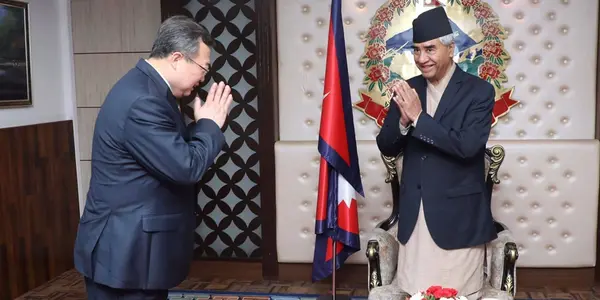Nepal has conveyed to a visiting senior Chinese Communist Party official that the country only wants grants from China, not commercial loans for developing infrastructures under the ambitious Belt and Road Initiative (BRI).
Prime Minister Sher Bahadur Deuba made the remarks at a meeting with the visiting Chinese Communist Party (CCP) leader, Liu Jianchao, in Kathmandu, according to prime minister's press adviser Govinda Pariyar who was present during talks on Sunday.
"PM Deuba told the Chinese leader that Nepal is not in a position to afford commercial Chinese loans for infrastructure building under the BRI because the national economy is already under stress due to several reasons including the depletion in foreign currency reserves. Therefore, Nepal wants only grant assistance from China in the coming days," Pariyar told India Narrative on Monday evening.
On the occasion, Liu, who is the head of CPC's International Liaison Department, urged Deuba to accelerate projects under the China-initiated BRI, an infrastructure initiative taken by Chinese President Xi Jinping to connect China with Asia, Europe and Africa.
The prime minister's communication to Liu comes at a time when the Himalayan nation is expressing its unwillingness to move ahead with the cooperation under the BRI mainly owing to the fear that it may slip into a debt trap like another South Asian neighbour Sri Lanka, sources said.
Nepali government officials also echoed the prime minister's sentiment of opposing commercial loans from the northern neighbor under the BRI.
"Firstly, we prefer grants from China because we can't afford high-interest rates associated with BRI loans with a relatively short payback period. Secondly, BRI projects are not open for competitive bidding thereby lack financial transparency," a senior government official at Nepal's Ministry of Finance, told Indian Narrative in a brief conversation. He said that Chinese loans constitute three percent of Nepal’s total foreign loan portfolio.
China often extends loans to other countries in commercial terms via the EXIM bank, Asian Infrastructure Investment Bank (AIIB) and the Silk Road Fund. Nepal is also one of the founding members of the China-initiated AIIB.
EXIM BANK of China may take over Mombasa port if Kenya fails to service the loan it took to build SGR, says report by Auditor-General Edward Ouko. pic.twitter.com/TvMt9UV937
— Nation Breaking News (@NationBreaking) December 19, 2018
Mrigendra Bahadur Karki, a geopolitical analyst and an assistant professor at the state-run Tribhuvan University, believes that Nepal is unlikely to move ahead with BRI projects at least until the general elections which are scheduled to take place in November this year.
"Nepal’s preference to grant over loans also may not help projects under the BRI to take off. The country has a long experience of taking loans from multilateral agencies like the World Bank, where interest rates are relatively low and payback periods are long," he said.
A key component of the BRI is the much-hyped Trans cross-border Nepal-China railway which has been also an integral part of the Trans Himalayan Multi-Dimensional Connectivity Network proposed by China.
Nepal and China, during the visit of Chinese President Xi in October 2019, had agreed that “Nepal and China will take the Belt and Road Initiative as an important opportunity to deepen mutually beneficial cooperation in all fields in a comprehensive manner, jointly pursue common prosperity and dedicate them to maintaining peace, stability, and development in the region.”
Although Nepal seems reluctant to go ahead with the BRI, China has kept nudging Nepal on different occasions for the same. Most recently, the project-selection under the BRI was among the top agenda items when China’s State Councilor and Foreign Minister Wang Yi visited Nepal in March this year. During the visit, the two countries also signed nine separate bilateral agreements including technical cooperation on cross-border railway. However, the Ministry of Foreign Affairs of Nepal, which issued a statement on the same occasion, did not mention anything on BRI projects.
Contrarily, after Wang's visit, a statement from the Chinese Ministry of Foreign Affairs, stated that the past several years witnessed gratifying progress in Belt and Road cooperation between China and Nepal.
"China is ready to advance the key cooperation projects between the two sides at a faster pace, ensure the smooth running of land ports between the two countries, explore cross-border cooperation in electricity, diversify and expand channels for economic, people-to-people and cultural exchanges, and build the Trans-Himalayan Multi-Dimensional Connectivity Network to make the Himalayas a bond of friendly cooperation between the two countries," the statement added.
Also Read: Senior Chinese official arrives in Nepal to unify Communist factions ahead of elections




















